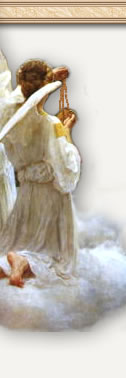




 |
|

|
|
|||||||||||
|
|
|
|
||||||||||||
 |
|
|
||||||||||||
 |
|
 |
|
|||||||||||
|
|
||||||||||||||
 |
 |
|
|
|
|
An Interview with
Michael Rose TLM: Give us a little background about your new book Goodbye, Good Men. That’s quite a title. What does it mean? Rose: The thesis boils down to this: for more than thirty years now, qualified candidates for the priesthood have been turned away precisely for political reasons. Not because they were found unsuitable for seminary or for ordination, but because they were seen as a threat to the liberal status quo. What I’m talking about in my book is a systematic, ideological discrimination against orthodox candidates to the priesthood. TLM: What exactly is meant by the “orthodox” candidate? Rose: As I employ the term throughout the book, “orthodox” connotes adherence to the Magisterium of the Church and full acceptance of authentic Church teaching. It refers to the man who embraces the authentic traditions, devotions, and piety of the Church. The orthodox man is he who does not support women’s ordination, who defends the Church’s teaching on human sexuality and artificial birth control, who exhibits piety toward devotions such as the Rosary and Eucharistic adoration, and who accepts the Church’s understanding of the priesthood and doesn’t have an agenda to redefine or “re-envision” it. TLM: One would think that the orthodox candidate, at least in most ways, would be an ideal candidate for the priesthood in the Catholic Church. Rose: Yes, that’s certainly what common sense would dictate. But unfortunately there have been other forces at work throughout the last three decades that defy common sense, that defy even common decency. Turning away candidates who explicitly and proudly accept the Church’s teaching has been likened to a Marine recruiter turning away prospects because they profess a love for America—or perhaps more to the point, because they won’t embrace a Communist agenda, an agenda that would intrinsically undermine the nation. TLM: You mentioned “forces at work.” What do you mean by that? Is it the “smoke of Satan” that has entered the Church? Rose: That’s one way of putting it—and it would be most accurate. I think we ought to remember though that the devil uses men (and women too, of course) to carry out his works. And what we see are dissenting Catholics who have hijacked the priesthood in order to change the Church in illegitimate ways from within—the Church’s structure, the Church’s disciplines, and the Church’s teaching. Often they are concerned with justifying their own lifestyle, their own sins, especially in the area of sexual sin. TLM: In one chapter you detail the ways in which heterodoxy drives “good men” away from the seminaries. What’s the modus operandi at work there? Rose: Let me preface my answer by giving a little background about how I came to write this book about vocations and seminaries. When I was editor of St. Catherine Review, I was put onto a story about the seminary in Cincinnati. What I found was that one professor (Aaron Milavec), hired to teach a generation of future priests, denied two essential doctrines of the Catholic faith: the ministerial priesthood and the Real Presence of Jesus in the Eucharist. And another theology professor, Sr. Barbara Fiand, who had been teaching there for seventeen years, was a resolute opponent of the male, celibate priesthood. Seminarians there said she gave the impression that she wanted no man ordained to the priesthood, not even the liberal ones that went along with her program. TLM: It’s hard to believe that seminary professors wouldn’t believe in the Catholic priesthood. Rose: It’s outrageous—and hypocritical, I might add. With further research I found that professors like Milavec and Fiand weren’t exactly anomalies. TLM: I know this might seem to be a naďve question—yet an obvious one—but, why don’t they become Protestant theologians and Protestant seminary professors Rose: In order to answer that question one must realize that the essence of their academic careers doesn’t seem to be to teach their idiosyncratic theology, although that is a prerequisite for sure. The essence of their careers is to change the structure, doctrines, and mission of the Catholic Church. They appear to be teaching at Catholic seminaries primarily to train seminarians not to be priests. TLM: And getting back to the discrimination against orthodox seminarians, how does that fit in? Rose: Well, it works in several ways. Some candidates are screened out right from the beginning, being denied even admission to the seminary. Now, admittedly the Church has the grave duty of screening out candidates that don’t belong in seminary, and there are any number of legitimate reasons not to admit a man. But I’m not talking here about a process designed to winnow out false vocations. Rather, the orthodox candidate often times must pass a litmus test, so to speak. TLM: Is this a sort of test to determine whether or not a candidate is “politically correct”? Rose: That’s exactly what it is. So what we have seen over the past thirty-some years is that candidates who, for example, expressed the Church’s teaching on sexual issues were labeled “sexually disordered” or “rigid.” TLM: Who are these gatekeepers who are sizing up the candidates for PC reasons Rose: At this stage we’re talking about
the vocations office and the psychologists who are hired to
assess the suitability of a candidate. In the case of the
vocations office, one of the common probing questions is
“What do you think about women priests,” and too often the
honest candidate who states correctly that the Church has no
ability to ordain women to the priesthood is dismissed. The
politically correct answer is: “Oh yeah, I’m open to it,
sure.” TLM: But obviously some orthodox men do make it into the seminary; what then Rose: It’s important to understand that there are certain dioceses which don’t put their candidates through unethical psychological tests or give them PC litmus tests. These are, by and large, the same dioceses which don’t have a vocations crisis or a priest shortage, and it’s no coincidence. But yes, even other dioceses and religious orders let some orthodox guys through the gate—perhaps hoping that they can be formed according to the PC norms to accept the tenets of feminism, the gay agenda, secularism, and modernist liturgical practices. The orthodox man who arrives at seminary expecting to find like-minded faculty and peers can be sadly disappointed. But I might add here that these days—at least since the mid-1990s or so, the problems are more with the faculty than with the students. The seminarians in the 21st century are, overall, much more conservative and tradition-minded than the seminarians of 20 or 30 years ago. TLM: Does that create a tension between the young orthodox seminarian and the middle-age Modernist? Rose: It does. Faculty and formation priests and nuns at many seminaries still have a difficult time hiding their animosity for the Church and the priesthood. And their effects on the seminarians are deleterious. Some guys stick it out and “play the game,” saying what the liberal faculty want to hear, playing dumb, and so forth. And some of them are able to advance to ordination. Others are driven away—repulsed really, by the affront to Church teaching and discipline they witness. They leave on their own initiative even if they believe they still have a genuine vocation to the priesthood. Other orthodox seminarians are sent to psychological counseling to be “re-treaded,” or simply intimidated. Others have been ridiculed and persecuted and expelled for being “rigid” or “doctrinaire.” Their crimes are piety, devotion, love of the Church and her teaching. TLM: Obviously one of the great strengths of Goodbye, Good Men is that it helps one understand the current spate of sexual abuse scandals that have been plaguing the Church this year. What’s the relationship between the current scandals and what has transpired in seminaries over the past thirty years? Rose: In bringing the “sexual revolution” into the Church, liberals have welcomed—even preferred—radicalized active homosexuals to orthodox seminarians in the name of “tolerance.” Now that tolerance has been exposed as a toleration of criminal acts. The extent of the sex abuse scandals and the accompanying payoffs and cover-ups has mystified many of the faithful who are simply at a loss to understand how this could have occurred, and why it was swept under the rug for so long. Goodbye, Good Men presents evidence that the root of this problem—both the cover-up and the sex abuse itself—extends down to the very place where vocations to the priesthood germinate: the seminary. The corrupt, protective network starts in many of these seminaries, where gay seminarians were encouraged to “act out” or “explore their sexuality” in highly inappropriate ways. Through the seminaries, moral and religious liberals have brought a moral meltdown into the Catholic priesthood. If the sex scandals that have rocked the Catholic Church are to end, the individuals responsible for this moral meltdown must be rooted out. Only then will the “dark shadow of suspicion,” as the Pope calls it, be removed from “all the other fine priests who perform their ministry with honesty and integrity, and often with heroic self-sacrifice.” TLM: I’ve read some reviews of Goodbye, Good Men. Some have been very positive—in secular newspapers like the Philadelphia Inquirer and in some Catholic periodicals like Crisis and Homiletic & Pastoral Review. The New York Post even ran excerpts from the book. But I’ve noticed that others have been very critical, not so much of your thesis but of your methodology. Some so-called conservative Catholic periodicals have run bitterly critical reviews. Why are they so bothered? Rose: Most of the negative reviews have taken issue with the fact that much of the evidence I present is anecdotal. In the course of my research I conducted 150 interviews, most of them with former and current seminarians, about half of whom are now Catholic priests. It is mainly from these interviews that I was able to identify a pattern. With little variation these men told me of essentially the same unnatural obstacles placed in the path of authentic vocations to the priesthood: a biased application screening process, the abuse of psychological counseling, seminary gay subculture, promotion of ideas and teachings which undermine Catholic belief, an open contempt for traditional devotions and liturgy, and so on. Taken together the testimony of the 150 interviewed demonstrates how widespread these problems have been over the past three decades. How else could such a book as Goodbye, Good Men have been written if not by including actual personal accounts illustrating these roadblocks? TLM: But your book seems to rely on more than just anecdotes, isn’t that true? Rose: Absolutely. Textbooks used in seminary courses are reviewed. Comparative statistics are presented, and a vast amount of information from previously published sources is culled together under one cover. That amounts to a whole lot more than just anecdotal evidence. Some people seem to want to fault me for not writing a “current state of the seminaries report.” Well, that’s not the book I wrote. Goodbye, Good Men is not meant to be a sociological, statistical analysis. What my book does is tell the stories of men who, until now, had no recourse to justice, and who were humiliated and silenced by leaders of their beloved Church. TLM: Another criticism leveled against your book is your choice of sources. One publication faults you for the use of what they deem “dubious sources.” And others try to say that these men just have axes to grind. Rose: In order to demonstrate that I used “dubious sources” the one publication took issue with one statement by one former seminarian who was quoted once in the book. The reviewer, a recently ordained priest, did not personally find this man credible. And he went on for two whole pages, rather hysterically, about that. The fact is, however, that I did find the man credible; he was recommended to me by two prominent and well-respected priests and other laymen; he was willing to go on record; and his statement was corroborated by several other men from the seminary in question. Since that time the reviewer-priest has been on an Internet smear campaign to try to discredit the book, even though by his own admission he too suffered through much of what I discuss in the book, and was even expelled from two seminaries. TLM: The National Catholic Register and other critics also fault you for being “one-sided”—not getting the seminaries’ response to the allegations made by the seminarians. Rose: The Register ran an op/ed piece written by David Pearson accusing me—and others— of destroying Catholic journalism (“Goodbye, Good Journalism?” June 30, 2002). Pearson was “hopping mad,” he wrote, because I published criticisms of a personal friend of his, Father Marcel Taillon, the vocations director of the Providence diocese in Rhode Island. I was said to have attacked his friend. But anyone reading the book will see that Father Taillon is never attacked. It is his media campaign to sell the priesthood that is criticized—a campaign which includes advertising on the raucous MTV cable station. What really makes Pearson upset is that I didn’t phone in to Father Taillon or his bishop for comment. Pearson neglects, however, to mention that I quoted his priest friend from previously published comments, which are amply footnoted; and I also quote a defense of his media campaign written by the editor of Providence’s diocesan newspaper. After all, I was writing a book based on thirty-some years of material. Books often rely on previously published material. In fact almost every nonfiction book on the market quotes from secondary sources. In many other cases I do quote seminary officials giving their official denials, usually from written documents. Again, this seems to be overlooked by critics. And the standard response to criticism of seminaries over the years has been just that: denial, denial, and more denial. This is a big part of the problem. The official response is invariably: “all is well.” Even the Vatican’s investigation of U.S. seminaries in the mid-1980s could not get the truth out of them. That investigation was recognized widely as a whitewash. TLM: Besides these few criticisms how has the book been received? I’ve noticed that the book has been on the New York Times bestseller list for several weeks now. I take that as a good sign? Rose: The response has been varied, of course, but from what I can tell it has been overwhelmingly positive—especially from priests and seminarians who’ve been waiting for a book like this to come out for years. Some bishops have praised it while others have denounced it as tabloid journalism. I’m told by sources in Rome that it is being read in Vatican circles and taken very seriously. I hope that’s true. |
|



♦ About The Mass ♦ Resources ♦ How To Help ♦ Contact Us ♦